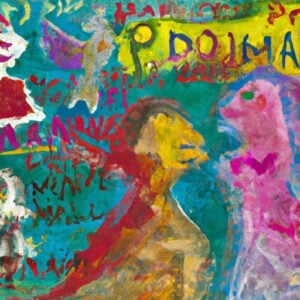Discover the most commonly used Italian slang words in everyday life with our comprehensive list. Impress your Italian friends with your new vocabulary!
If you’re planning to travel to Italy, you might want to brush up on some Italian slang words. Slang is an essential part of any language, and Italian is no exception.
Italians are known for their passionate use of language, and their slang is an expression of that passion. In this blog post, we’ll take a look at some of the most popular Italian slang words used in everyday life.
Learning everyday slang terms and phrases that are frequently used in conversation can make learning a new language, which can be a difficult process, easier.
The Italian language is a language renowned for its deep cultural heritage and aesthetic appeal. It is also well recognized for its distinctive lingo, which is frequently employed in casual interactions.
You must be familiar with the most prevalent Italian slang expressions whether you’re thinking of visiting Italy or just want to study some slang for fun.
Background on Italian slang
Slang is a form of informal speech that is frequently employed in daily interactions. Italian slang has changed over time and is affected by several variables, including social class, area, and age.
Words from dialects that have merged into the standard language are frequently seen in Italian slang. Shortened words, obscenity, and allusions to Italian culture are typical elements of Italian slang.
Top Italian slang words used in everyday life
Here are some of the top Italian slang words and phrases used in everyday conversations:
- Ciao – Hello/goodbye
- Figurati – No problem/You’re welcome
- Che casino! – What a mess!
- Dai! – Come on!/Let’s go!
- Figo – Cool/Awesome
- Basta! – Stop!/That’s enough!
- Scusa – Sorry/Excuse me
- Mannaggia – Darn!/Damn!
- Non c’è problema – No problem
- Mamma mia! – Wow!/Oh my goodness!
These words and phrases are commonly used in Italian conversations, and it’s important to understand them to have a better grasp of the language.
Regional differences in Italian slang
Italian slang words and expressions can vary by region. For example, the word “sfigato” means “loser” in Rome but is used to describe something unlucky or jinxed in Milan.
In Naples, “mascia” means “girlfriend,” while in Florence, it means “friend.” Understanding regional differences in Italian slang can be particularly useful when traveling to different parts of Italy.
Cautionary notes when using Italian slang
While Italian slang can be a fun way to communicate and connect with locals, it’s essential to use it appropriately. Some slang words can be offensive, particularly if used in the wrong context.
It’s essential to understand the meaning and context of each slang word and use them carefully to avoid offending native speakers or coming across as disrespectful.
Examples of Italian slang words
Che figata!
It’s typical to hear people in Italy say “how cool,” which translates to “how impressive,” “how exciting,” or “how interesting.”
You can say this to show your enthusiasm for a great work of art, a breathtaking vista, or simply a perfectly prepared pasta dish. When someone in Italy demonstrates something outstanding to you, don’t be afraid to respond with “che figata!”
Ciao
The Italian word “ciao” is extensively used all across the world. It’s a kind way to say welcome or farewell. The phrase “s-ciào vostro,” which translates to “I am your slave,” is the source of the word, which is of Venetian origin.
Since then, it has developed into a widely used informal greeting in Italian.
Figo
In Italy, young people frequently use the slang term “figo,” which has the connotations of “cool” or “awesome,” to refer to something outstanding or stylish.
Any item, from a person’s attire to a brand-new car, can be described using this phrase. Like “che figata,” “figo” is a common phrase for appreciation.
Allora
Italian has many useful words, and “allora” is one that is frequently used in daily speech. It’s frequently used to suggest a change in subject or to introduce a new notion. In a conversation, you can hear this word used when someone is attempting to explain something or give more details.
Another usage for it is to convey surprise or shock. In order to emphasize your surprise, you can say “allora?” in response if someone informs you they won the lotto.
Mamma mia
“Mamma mia” is a popular Italian expression that’s used to express surprise, shock, or disbelief. It’s often used in situations where someone is impressed or astonished.
For example, if someone tells you they just climbed a mountain, you might respond with “Mamma Mia!” to express your admiration. This expression is also commonly used in Italian-American culture and has been featured in numerous films and TV shows.
Fatti i fatti tuoi
“Fatti i fatti tuoi” is a common Italian phrase that means “mind your own business.” It’s often used when someone is being nosy or interfering in someone else’s affairs.
This phrase can be used in a friendly or hostile tone, depending on the context. If you’re in Italy and someone tells you to “fatti i fatti tuoi,” it’s probably best to take a step back and avoid getting involved.
Andiamo!
“Andiamo!” is an Italian word that means “Let’s go!” and is frequently used to convey eagerness or fervor. If someone proposes taking a walk while you’re out to dinner, for instance, you could enthusiastically respond, “Andiamo!”
Italians frequently use this idiom to convey their ardor for life and want to be present in the moment.
Basta
The adaptable Italian word “basta” is frequently used to convey a variety of emotions. Depending on the situation, it may signify “stop” or “enough.”
Saying “basta!” to someone who is talking too much, for instance, will let them know you’ve had enough. Similarly to this, you might yell at someone to “basta!” to get them to cease being impolite or confrontational.
Contrarily, the word “basta” can also be used to convey happiness or satisfaction. For instance, you might say “basta” to express fullness and satisfaction after eating enough food.
Fregarsene
“Fregarsene” is a slang word that means “not to care.” It’s often used in casual conversation to express apathy or indifference towards something.
For example, if someone is talking about a problem that doesn’t concern you, you might say “me ne frego,” which is a shortened version of “non me ne frega niente,” or “I don’t care.” This phrase can be used in a dismissive or nonchalant tone, depending on the context.
Aperitivo
A traditional Italian custom called “aperitivo” is enjoying a drink and a snack prior to dinner. It is a shared social experience that is frequently had with friends or coworkers.
Similar to American happy hour, aperitivo places an emphasis on small bites and beverages like wine, prosecco, or Aperol spritz. If you’re in Italy and someone asks you to an aperitivo, take advantage of the chance to mingle with locals and learn about their culture.
Cazzeggiare
Cazzeggiare is a slang phrase that means “to waste time” or “to goof off,” and is frequently used to describe pointless or useless activities like social media surfing or TV viewing.
Cazzeggiare is typically not a compliment when it is leveled at you. Cazzeggiare has a positive aspect as well, though, which is the opportunity to take a vacation from work and relax.
Learning more about Italian
Italian slang words are an important part of everyday conversation in Italy. They reflect the country’s rich culture and passionate way of life.
Whether you’re planning to visit Italy or simply want to learn Italian, knowing some common Italian slang words can help you connect with locals and express yourself more effectively.
From “che figata” to “cazzeggiare,” these words will add color and personality to your Italian vocabulary.










One Response
Wow, this is such a helpful and fun post! I can’t wait to impress my Italian friends with these slang words. Grazie mille!